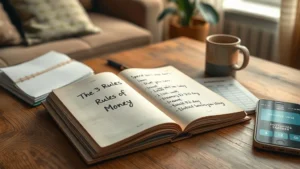Ever wake up with that heavy, “Oh no, how am I going to get ahead?” feeling when the bills start to pile up — all while that little voice whispers that everyone else seems to have it all together? Trust me, you’re definitely not alone. In fact, most people haven’t ever been taught what is better money habits, let alone how to build them. But what if building a good relationship with your cash flow wasn’t about some picture-perfect spreadsheet, but real, doable steps — something you could start this very week?
Yeah, it’s not magic. It’s not about being perfect, either. It’s about making friends with your money, one small habit at a time. So, let’s get completely honest and practical. We’re diving right into the “what,” the “why,” and, most importantly, the “how” of better money habits. More importantly, you’ll finish knowing exactly where to start… not just for peace of mind, but for a little future freedom, too.
Defining Better Money Habits
So, What Is “Better Money Habits” Anyway?
It’s not complicated at its core: better money habits are those simple, mindful choices you repeat around money — the kind that stack up over time and actually change your financial reality, no matter how much (or how little) you bring in. Think of it as a series of small, friendly nudges: consistently tracking what you spend, putting away a sliver into savings before splurging, and checking your credit instead of hoping for the best. It’s not one-size-fits-all, and it’s definitely not “get rich quick.” Instead, it’s small, human moments strung together in a way that feels, well, better.
Better Money Habits vs. “Hacks”
Let’s get real — there’s no shortage of flashy “hacks” promising to triple your savings overnight or wipe out all debt with the mystical secrets of internet gurus. But honestly, better money habits are about consistency and small progress, not some miracle trick. Building good habits is like tending a garden: pull a few weeds, plant a seed, see how it grows. Hacks? That’s like dumping fertilizer everywhere and hoping for the best… often a mess you’ll regret.
Why Habits Matter (Real World Benefits)
Here’s the good stuff: when you build actual “better money habits,” you tend to stress less and save more. Maybe you feel ready when an emergency hits, or you finally save up for a trip you’ve put off for years. Research from Bank of America’s Better Money Habits education resource center shows people who commit to simple habits — like paying themselves first or budgeting every month — are more likely to feel in control, and less likely to spiral when money gets tight.
The Risks (So You’re Not Blindsided)
I gotta be honest: any habit, even helpful ones, can be overdone. Ever heard of someone “over-automating” — forgetting to pay attention, letting subscriptions pile up, or building a budget so strict it makes you miserable? Balance is critical. Remember, if a habit leaves you more stressed, guilty, or out of control, it’s time to recalibrate.
Your 10 Essential Better Money Habits
Let’s dig into the meat and potatoes. These are the habits anyone — yes, even you! — can use, no matter where you are on the money map.
1. Knowing Your Numbers: What’s Coming In and Going Out
Sounds boring, right? But it’s actually kind of empowering. Set a timer for 15 minutes. List every income stream. List what you spend — rent, groceries, gas, little treats. Use an app, a sticky note, whatever. What matters is seeing the snapshot: “Here’s what I’ve got. Here’s where it goes.” That’s where real change begins.
Monthly Snapshot Cheat Sheet
Want to make this part easy? Each month, write down your take-home pay and what leaves your account. Spend 10 minutes tallying up. That’s 120 tiny minutes a year — less than a slow movie, and the payoff is huge.
2. Building a Budget That Doesn’t Feel Miserable
There’s no single “right way” to budget. Some folks love detailed categories, others prefer “buckets” — 50/30/20 rule, anyone? Or maybe you just need an envelope with cash for spending. The point isn’t perfection, it’s clarity. Adjust as needed. If your budget feels like a punishment, tweak it until it actually fits your life. That’s real better money habits budgeting.
Three Starter Methods to Try
- Zero-based: Give every dollar a job each month (no “leftovers” to disappear quietly).
- 50/30/20: 50% needs, 30% wants, 20% savings/debt payoff.
- “Envelope-lite”: Set a weekly spending limit you actually enjoy — guilt-free splurge included.
3. Automate Savings and Bills—But Actually Pay Attention
Trying to remember every due date? Forget it. Instead, set up your savings to transfer right on payday — even if it’s just $10. Automate your bill payments. Just make sure you still check your accounts monthly. Automation helps, but you’re still the boss.
Automation Pitfalls (And How to Dodge ‘Em)
Keep a simple list: What’s being paid automatically, and which bills still need a human touch? Set a monthly calendar alert to eyeball it all. You’ll spot problems before they snowball.
4. Create an Emergency Cushion (So Life Doesn’t Derail You)
Even $500 in accessible savings can make surprise expenses less scary. Aim for three months of living expenses over time — but don’t stress if that feels far away. A little buffer beats none.
Step-by-Step: How to Build Your Cushion
- Open a no-fee, easy-access savings account.
- Transfer what you can (even $25 a payday).
- Forget about it — until you need it.
5. Kill High-Interest Debt—But Don’t Shame Yourself
Whether it’s those sneaky credit cards or old loans, interest can eat you alive if left unchecked. Try the “debt avalanche” (pay highest rate first) or the “debt snowball” (pay smallest first for quick wins). Both work, as long as you stick to it. And if you ever need to regroup or get extra help, a better money loan for debt consolidation could be worth considering. Just read the fine print and go slow.
| Strategy | How It Works | Emotion Boost |
|---|---|---|
| Debt Avalanche | Pay off highest interest rate first | Save more money over time |
| Debt Snowball | Pay off smallest balance first | Quick wins and easy motivation |
6. Use Credit Like a Tool, Not a Trap
Your credit score isn’t just a mysterious number; it’s your pass to affordable loans, better apartments, even new jobs. Build your score by paying on time and keeping balances low. Check your score every few months — it’s free, and it’s empowering to see real results over time.
7. Start Saving for Retirement…Like, Yesterday
I know — retirement can feel “forever away,” especially with everything else demanding your money right now. But even $20 a month in a work 401(k) or IRA? Your future self will send you a thank-you card someday. Remember, thanks to compound interest, small steps now mean less pressure later — and maybe even an earlier “freedom day.”
Risk vs. Reward (Plain Talk)
Investing can be intimidating, sure. But not investing might be even riskier (think: outliving your money). Start small, focus on learning, and add more as you grow confident.
8. Tame the Impulse Spending Monster
We all love little treats, but $8 here and there can snowball into “where the heck did my money go?” Try the “24-hour rule”: want something non-essential? Wait a day; see if you really want it. And once a month, scan your subscriptions and cancel anything that’s become more “background noise” than joy.
Monthly Cancel-or-Keep Review
Print a list of your active subscriptions. Mark each as “love it” or “meh, could ditch.” Anything that gets three “mehs” in a row? You know what to do.
9. Keep Learning — Make It Fun!
You wouldn’t expect to master cooking just by reading a cookbook, right? Same with money. The best money pros I know are always learning. Dive into a better money habits khan academy course or explore a new better money habits video each month. Or gamify your learning with the bank of america financial literacy game. Financial wisdom doesn’t have to be dull — it can even be kind of addictive once you start seeing little wins.
10. Review and Adapt As Life Changes
Your best money habit from last year might be out-of-date today. Every few months, check in: “Is my budget working? Am I saving enough? What can I tweak?” Don’t beat yourself up if things change — just stay nimble and curious.
Free Tools, Programs, and Resources
Bank of America’s Better Money Habits Education Resource Center
Ever checked out the Better Money Habits education resource center by BofA? It’s packed with articles, worksheets, personalized guides, and even hands-on tools designed to meet you where you are. Need to teach teens or want a better money habits high school lesson that’s actually relatable? They’ve got it. And if you’re visual, their better money habits video series makes learning feel easy, not intimidating.
Other Top Resources (And How to Use Them)
There are tons of ways to keep learning. Free budgeting apps can show you where your cash slips away. For a hands-on approach, try a financial literacy challenge — like a bank of america financial literacy game. If you ever want to double-check advice, you might also look at what experts share at places like Khan Academy or credible credit unions.
Real Stories, Real Results
Case Study #1: From “Always Broke” to Three Months Ahead
I remember a friend who always felt like money just vanished; every payday felt like filling a leaky bucket. One simple change — writing down every single expense for 30 days, no judgment — revealed that nearly $200 a month went to small snacks and ride-shares. She swapped some easy habits: made coffee at home, set a $40 “fun budget,” and auto-transferred $100 to savings. Six months later? She finally had enough to cover three months’ of bills, just in case. No wild sacrifices and zero misery.
Case Study #2: Attacking Debt with the Avalanche
If you’ve ever felt buried by debt, you’re not alone. Another buddy picked the debt avalanche method, focusing on a gnarly high-interest card. He automated the minimum on everything, then threw every spare dollar at the monster account. Did it take discipline? Yes. But each month, seeing that balance shrink felt like a little victory. Soon, the avalanche rolled down — again, not overnight, but bit by bit. That’s what better money habits look like in the wild.
Building a Plan That Fits You
1. Take Stock
What’s the single biggest money headache you’ve got? Getting clear about that (whether it’s debt, chaotic spending, or just confusion) is your jumping-off point.
2. Set Just Three Goals
Pick three money goals: one for this month, one for the next 90 days, and one “big picture” for the next year. Write them somewhere you’ll see every morning — on your fridge, in your phone, whatever works.
3. Pick Two New Habits
Maybe it’s automating a $20 transfer to savings. Maybe it’s having a money check-in with yourself each Sunday. Don’t try to change everything; pick one or two and let success snowball.
4. Review, Celebrate, Adjust
Each season, revisit your goals. What went better than expected? What hit a snag? Adapt — and celebrate every win, no matter how small.
Balancing Upsides and Pitfalls
The benefits? Financial stability, lower stress, progress toward your dreams. But being too rigid, ignoring red flags, or automating everything without checking — those are pitfalls just waiting to trip you up. If things feel stuck, or you notice overwhelming anxiety, it’s worth reaching out for professional advice. Remember, even pros ask for help when they hit a wall.
Next Steps — Your Adventure Awaits
Ready to dive in? Start by tracking your spending for a week — nothing fancy, just pure honesty. Or pick one tiny habit from this guide and try it for 30 days. Need a jump-start or want to mix it up? Go play a round of bank of america financial literacy game for a hands-on challenge, or watch a better money habits video from Khan Academy for a fresh perspective.
What’s your “aha moment” with money? If you’re curious, frustrated, or just a little bit hopeful — I’ve been there, and I promise you can get there, too. Want one final encouragement? You don’t have to be perfect, just a little better than yesterday. And every week, every month, that adds up to real freedom, possibility, and more peaceful sleep.
Your turn: pick a habit, try it out, see how you feel. And if you have questions or a story to share about your own better money habits journey — I’d love to hear what’s working (or what you’re still figuring out). Your future self is already cheering for you.













